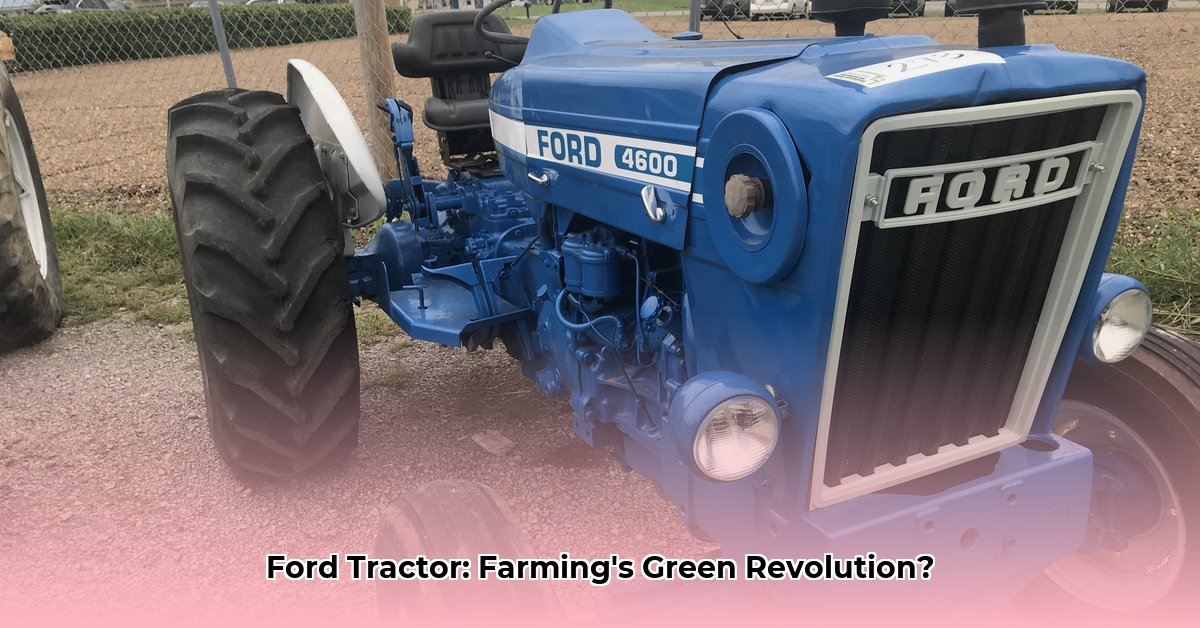
The Evolution of Sustainable Farming: From Iron Horse to Green Giant
The image of a Ford tractor evokes a powerful legacy in American farming. But the landscape of agriculture is evolving, demanding a shift from merely efficient farming to truly sustainable farming. This article explores how modern farming practices, coupled with innovative technology, are transforming the role of the classic Ford tractor in creating a greener future. We'll examine the transition from traditional diesel power to electric alternatives and the increasing importance of precision farming in minimizing environmental impact. Key aspects like choosing the right equipment for your farm and long-term sustainability planning will be discussed, all while keeping the iconic Ford tractor at the heart of the conversation. See more classic Ford tractor images here.
The Unexpected Environmental Legacy of the Ford Tractor
Early Ford tractors, while revolutionizing farming efficiency and arguably leading to less land use by allowing larger crop yields from smaller areas, weren't exactly paragons of environmental friendliness. Their fuel consumption was substantial, and emissions were significant contributors to pollution. However, their impact on increasing yields paradoxically reduced the need for extensive land clearing for agriculture compared to what previous farming methods might have required. This unintended consequence demonstrates how technological advancements, even with initial environmental shortcomings, can indirectly support sustainability goals.
How did such improvements in efficiency indirectly benefit the environment? The answer lies in reduced habitat disruption and deforestation. Higher yields from smaller acreages meant less land clearing for new farms, ultimately preserving ecosystems.
Electric Tractors: A New Era of Sustainability
Modern farming machinery, and particularly electric tractors, are rewriting the narrative of environmental impact. Electric tractors, while still a nascent technology, offer the compelling prospect of significantly reduced greenhouse gas emissions and noise pollution compared to their diesel counterparts. But their widespread adoption faces challenges.
Key Differences: Electric vs. Traditional Tractors
| Feature | Electric Tractor | Traditional Diesel Tractor |
|---|---|---|
| Emissions | Significantly lower | High |
| Running Costs | Potentially lower (dependent on electricity costs) | Generally higher |
| Range | Currently limited by battery technology | Significantly longer |
| Initial Cost | Typically higher | Typically lower |
The limited range of current electric tractors remains a significant hurdle, restricting them to smaller operations or requiring careful planning of work schedules and charging opportunities. Furthermore, the higher initial upfront cost is a barrier for many farmers. However, the long-term cost savings in fuel and reduced maintenance might offset this initial investment over time.
Precision Farming: Technology as a Sustainability Tool
Precision farming, facilitated by GPS, sensors, and advanced software integrated into modern tractors, offers a powerful means of enhancing sustainability. This technology allows for precise application of fertilizers and pesticides, minimizing waste and reducing environmental contamination. Farmers can target applications only where needed, optimizing resource use and minimizing the environmental footprint of farming practices.
Isn't it fascinating how technology can transform even the most traditional aspects of farming? The use of GPS and sensors allows for optimized use of resources, leading to higher yields and a smaller ecological footprint. But this requires careful implementation and ongoing training to fully maximize its potential.
The Future of Sustainable Farming: Collaboration and Innovation
The future of sustainable farming necessitates a multi-faceted approach involving collaboration between farmers, researchers, investors, and policymakers. Continued investment in research and development of electric tractors and related technologies, as well as government incentives and initiatives facilitating farmer adoption, are crucial aspects to achieving a truly sustainable agricultural system. Expanding access to reliable charging infrastructure and ongoing farmer training programs will also be essential in this transition.
Three Pivotal Points for Sustainable Agriculture:
- Embrace Electric Tractors: Their lower emissions offer substantial environmental benefits, despite range limitations.
- Invest in Precision Farming Technologies: This enables optimized resource use, minimizing waste and environmental impact.
- Foster Collaboration: A unified approach involving various stakeholders is vital for effective implementation and policy support.
The transition to sustainable agriculture is a complex, ongoing undertaking. By combining the robust reliability of the Ford tractor (and its modern counterparts) with cutting-edge technologies and proactive policy support, we can ensure a food system that supports both our needs and the health of our planet. The journey is long, but the rewards—a healthier environment and a more secure food supply—are substantial.